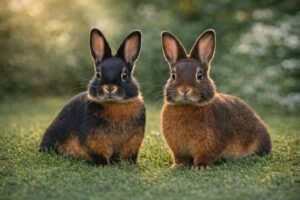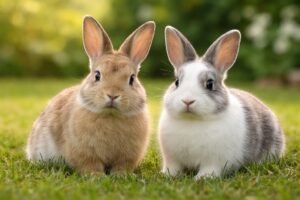A consistent rabbit feeding schedule is essential for your pet’s health. In this article, you’ll find a detailed plan for feeding your rabbit, including the best times for meals and the types of food that support their well-being.
Key Takeaways
-
A consistent feeding schedule, including morning, midday, and evening meals, is essential for a rabbit’s health and ensures proper nutrient intake.
-
A balanced diet for rabbits should comprise primarily of fresh hay, supplemented with leafy greens and a small portion of high-quality pellets.
-
Monitoring a rabbit’s weight and digestive health is critical to prevent obesity and gastrointestinal issues, with appropriate adjustments made as needed.
Establishing a Daily Feeding Routine

A consistent feeding routine is key to the health and well-being of pet rabbits. A structured schedule ensures timely nutrient intake, mimics natural feeding patterns, reduces stress, and promotes security. Regular feeding also allows owners to monitor their rabbits’ health and adjust food portions as needed.
Rabbits thrive on a diet rich in grasses and leaves, which should be incorporated into their daily feeding routine, consisting of three main meals: morning feed, midday snack, and evening feed. Each meal contributes uniquely to your rabbit’s health, and it’s important to consider what rabbits eat.
Morning Feed
The morning feed is essential for your rabbit. Early morning, when rabbits are most active, is ideal for their initial feeding your rabbit. Offering hay ensures continuous fiber access throughout the day, crucial for digestion. Hay and leafy greens in the morning stimulate natural foraging behavior, keeping them engaged and happy.
A consistent morning routine helps reduce stress by providing predictability. Alongside hay, include a small portion of fresh food, avoiding processed options. Feed stores offer a variety of suitable choices for the morning meal.
Avoid feeding pellets exclusively in the morning; a balanced diet is crucial for your rabbit’s health.
Midday Snack
Midday snacks keep your rabbit engaged and satisfied. Leafy greens like romaine lettuce, dandelion greens, and bok choy provide a healthy and refreshing break, adding variety and essential nutrients to their diet.
Alongside leafy greens, occasional treats like carrot tops and green peppers are beneficial. Avoid salty or sugary snacks and breakfast cereals, as they can harm your rabbit’s digestive system. Regular healthy treats significantly enhance your rabbit’s health and happiness.
Evening Feed
The evening feed is as important as the morning and midday meals. Replenish hay and water to keep your rabbit hydrated overnight. Since rabbits graze at night, continuous access to fresh hay is crucial.
A small portion of pellets in small quantities in the evening can satisfy the remaining hunger. Avoid uncontrolled feeding to prevent overfeeding and subsequent health issues.
A balanced diet with fresh hay, water, and a small portion of pellets keeps your rabbit healthy and happy.
Essential Components of a Rabbit’s Diet
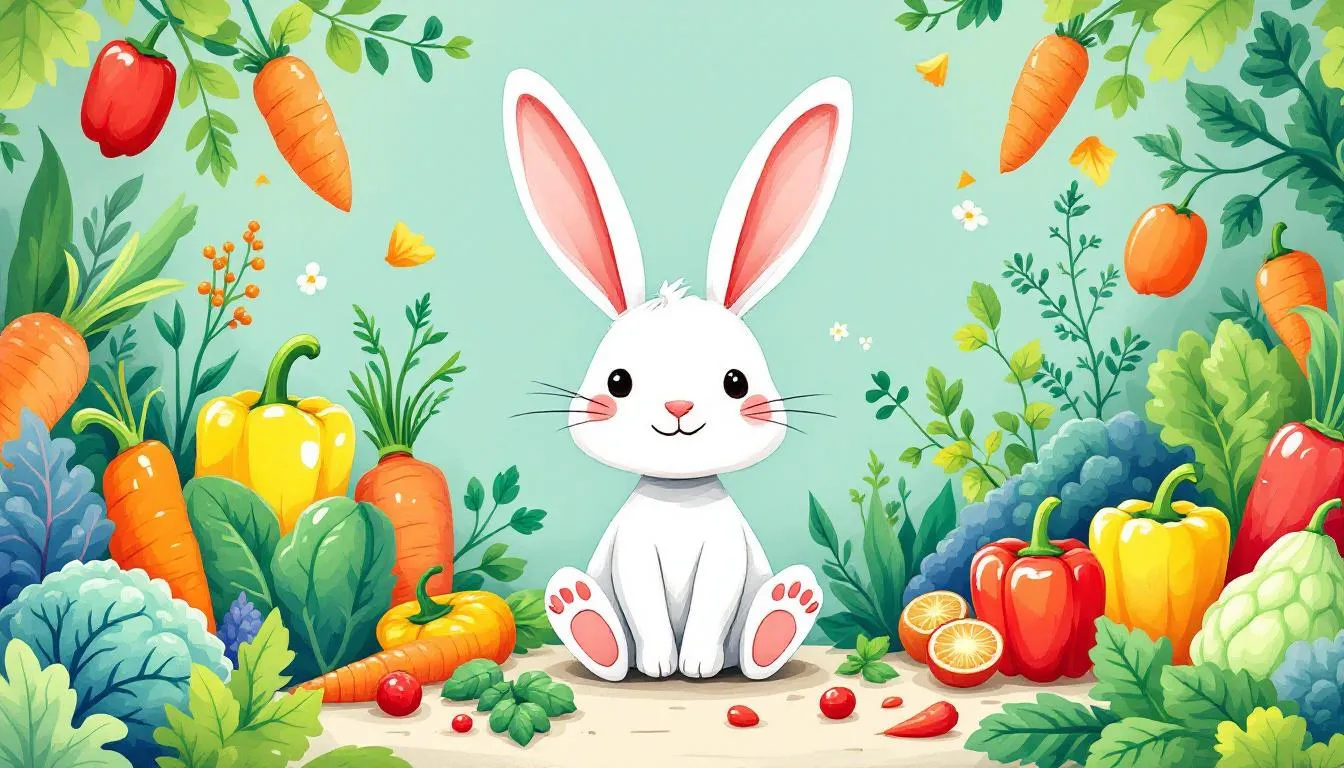
A rabbit’s diet is crucial for their health, primarily consisting of hay and grass, supplemented with leafy greens and a small quantity of pellets. Each component maintains digestive health and overall well-being. Fresh hay and water in the morning set a nutritious foundation for the pet rabbit’s diet.
Understanding the roles of fresh hay, leafy greens, and quality pellets ensures a balanced diet for your pet rabbit. These elements keep your rabbit healthy and engaged.
Fresh Hay
Fresh hay is the cornerstone of a pet rabbit’s diet. High-quality hay or grass should be the main component to maintain digestive function. Rabbits need at least one bundle of hay daily, equivalent to their size, to ensure sufficient fiber intake.
The wrong diet can cause serious dental disease, so offering the right type and quantity of hay is crucial. Timothy hay, orchard grass, and other grass hays are excellent choices.
A hay rack filled with fresh hay, mostly hay, ensures your house rabbit has constant access to this vital diet component.
Leafy Greens
Leafy greens are essential, providing necessary vitamins and minerals. Leafy green vegetables are safe options, including:
-
Spinach
-
Celery
-
Cabbage
-
Kale
-
Broccoli
-
Rosemary
-
Parsley
-
Mint
-
Dandelion leaves
Ideally, rabbits should receive five to six different types of leafy greens daily for a varied diet and to prevent boredom.
Introduce new types of greens gradually and in small amounts to avoid digestive upset. A variety of leafy greens helps maintain a balanced diet and keeps your rabbit interested in their meals.
Quality Pellets
High-quality rabbit pellets provide necessary nutrients, supporting growth and overall well-being. Provide approximately 1/4 cup of pellets per 5 pounds of body weight for adult rabbits, adjusting based on individual needs.
Avoid pellet mixes, as they may contain unhealthy ingredients and lead to selective eating, depriving rabbits of essential nutrients in a pelleted diet of good-quality rabbit pellets.
Choose Timothy pellets for adult rabbits, ensuring they are fresh and stored properly.
Monitoring and Adjusting the Diet
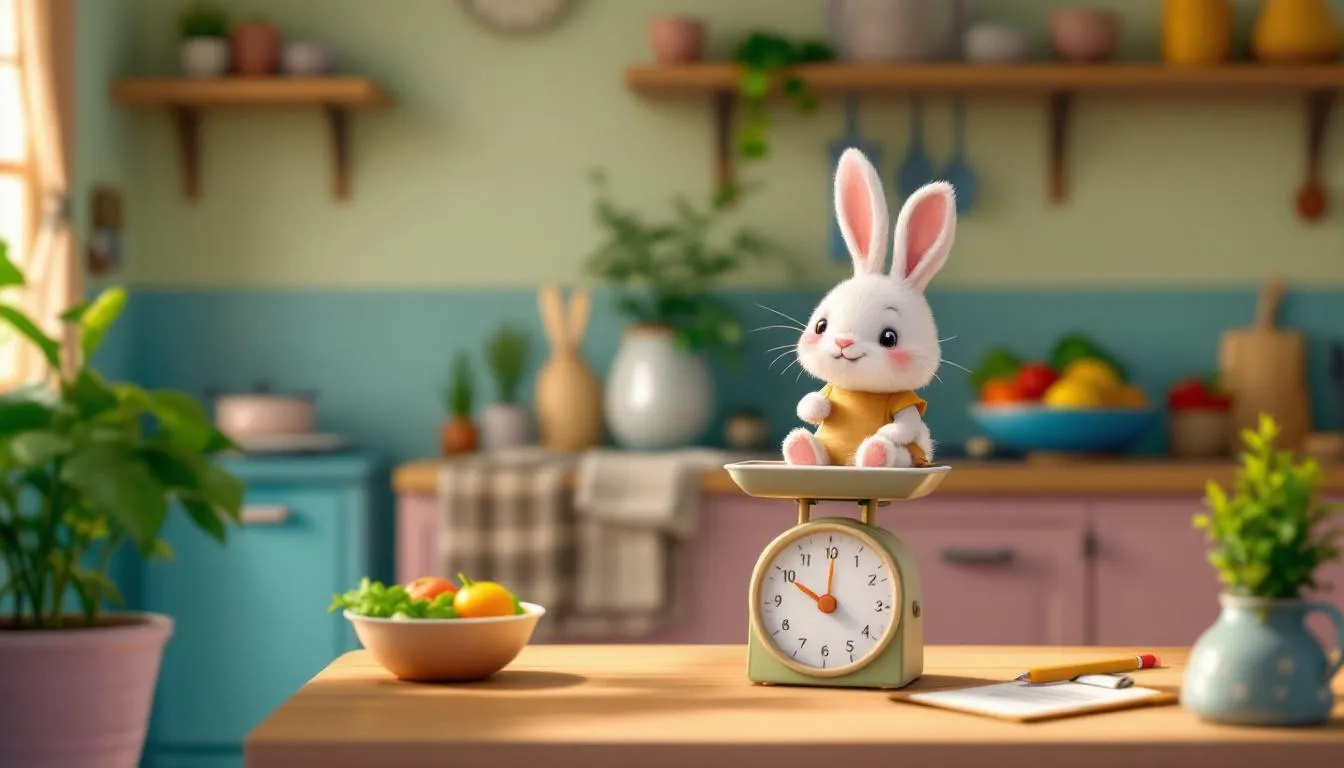
Monitoring and adjusting your rabbit’s diet is crucial for their health. A consistent feeding schedule prevents behavioral issues, obesity, and gastrointestinal problems. Mimicking natural feeding patterns keeps them healthy and content.
Consult a veterinarian immediately if you notice changes in your rabbit’s eating or drinking habits. Specific guidelines on weight management, digestive health, and considerations for young and ill rabbits are provided below.
Weight Management
Maintaining a healthy weight is essential for your rabbit’s well-being. A healthy rabbit is slim and sleek, with ribs that can be felt without a thick layer of fat. Food quantity varies based on age, lifestyle, and general health.
Give pellets in measured quantities, following the manufacturer’s guidelines to prevent overfeeding. Avoid topping up the bowl with pellets to prevent uncontrolled feeding and obesity.
Consult a veterinarian if concerned about your rabbit’s weight.
Digestive Health
Rabbits have delicate digestive systems, necessitating a balanced diet for normal digestion. Sticky droppings may indicate a rabbit is not eating caecotrophs, leading to digestive problems. Cecotropes are droppings rich in organisms, eaten by rabbits for health benefits.
If a rabbit has diarrhea or soft stool, book a vet appointment immediately. Avoid sudden dietary changes to prevent digestive tract upset.
Monitoring a rabbit’s weight and droppings is essential for assessing overall health and dietary adequacy.
Special Considerations for Young and Ill Rabbits
Young rabbits and ill rabbits have different dietary needs. Consult a veterinarian for specific dietary adjustments. Rabbits that are:
-
Growing
-
Pregnant
-
Nursing
-
Underweight may require larger pellet portions to support development. Young bunnies and baby bunnies that are still growing may also need special attention.
These rabbits may need additional nutrients and care. Tailor their diet to specific needs and monitor health closely.
Hydration Needs
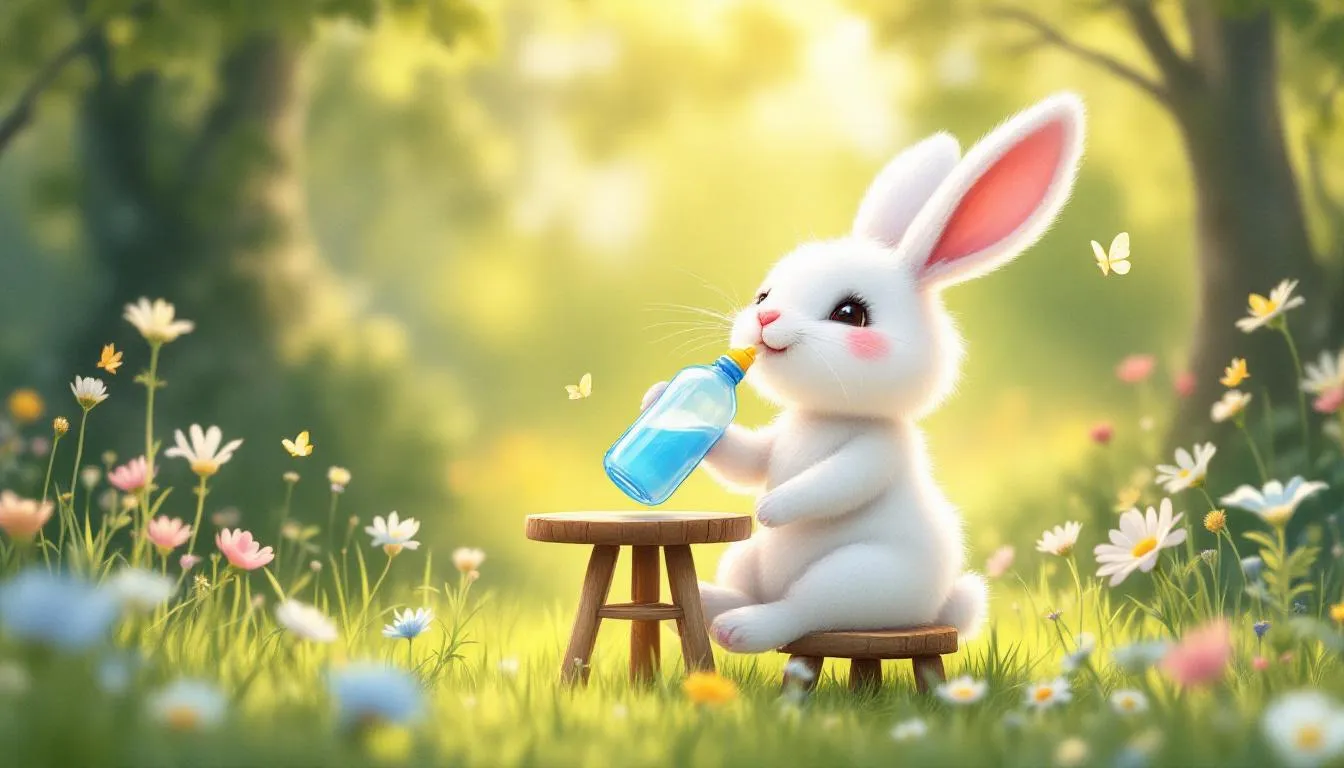
Hydration is critical in a rabbit’s diet. Constant access to clean water supports overall health and bodily functions. Proper hydration aids digestive and metabolic processes, reducing health issues related to dehydration and malnutrition.
Access to fresh water at all times is as important as a balanced diet to maintain good health. Below are preferred water sources and tips for maintaining clean water.
Water Sources
A heavy ceramic bowl is preferred for rabbits as it allows more natural drinking. While both bowls and bottles can be used, bowls are generally preferred for ease of access.
Inspect drip-feed bottles daily to ensure the spout is not blocked, ensuring your rabbit always has access to fresh water.
Maintaining Clean Water
Clean water is essential for your rabbit’s health. Daily cleaning of water containers prevents harmful bacterial growth.
Ceramic bowls are preferred over bottles for ease of cleaning and natural drinking. Water bottles may benefit rabbits with a dewlap to prevent wet fur and skin issues.
Healthy Treats and Foods to Avoid
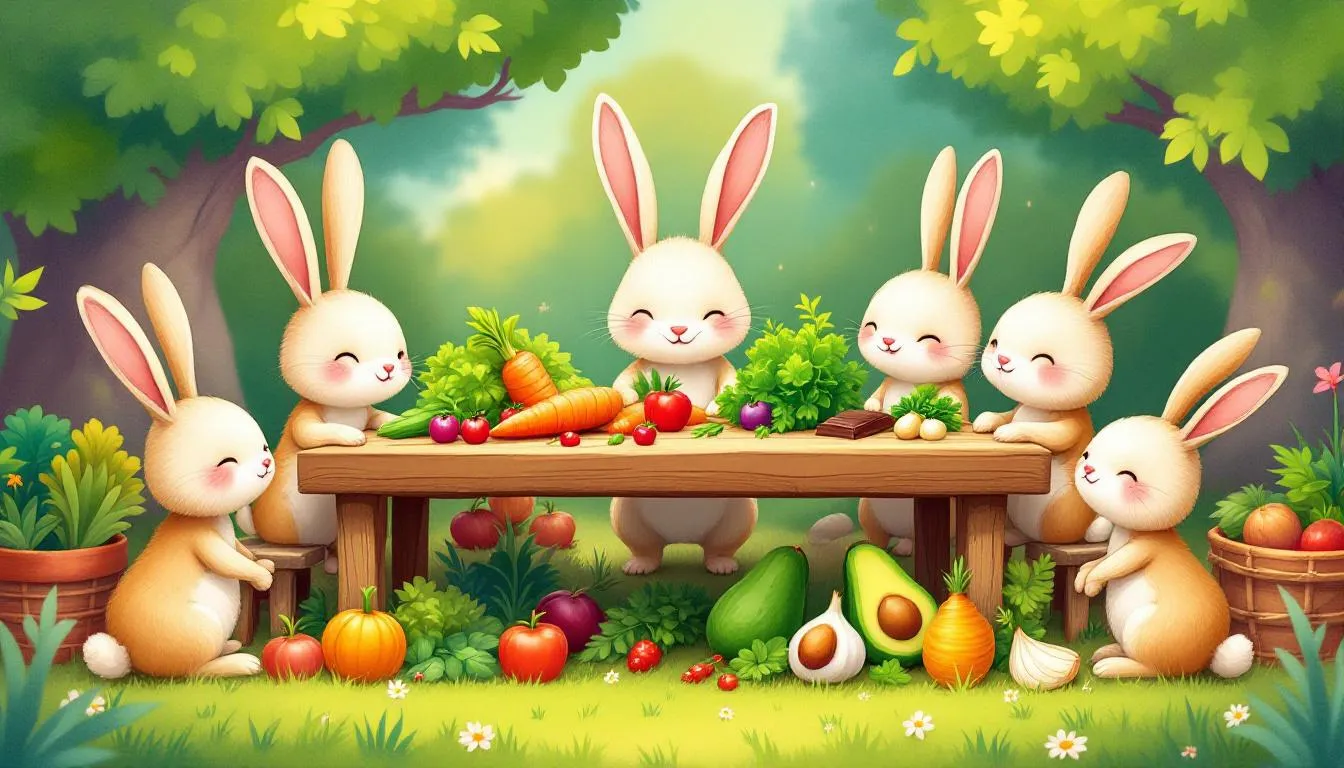
Treats should be given in moderation to prevent obesity and health issues. Healthy treats can enhance your rabbit’s diet and provide extra nutrients. However, be aware of treat foods to avoid for a healthy diet.
Knowing which treats are safe and which foods are harmful is crucial for your rabbit’s health. Below are guidelines on safe treats and foods to avoid.
Safe Treats
Safe treats include root vegetables like carrots in small amounts and bell peppers for variety. Limited quantities of dried fruits are also good occasional treats. Moderation is key to enhancing your rabbit’s diet with healthy treats.
Avoid salty or sugary snacks as they can disrupt your rabbit’s digestive system. Stick to fresh foods and healthy treats for a balanced diet and overall health.
Foods to Avoid
Avoid certain foods to keep your rabbit healthy:
-
Iceberg lettuce which offers little nutritional value and can be harmful in large amounts.
-
Houseplants can contain harmful chemicals.
-
Highly sugary snacks marketed for rabbits can cause serious health issues, including obesity and dental problems.
Maintaining a healthy diet involves knowing and avoiding harmful foods. Stick to fresh vegetables, fresh fibrous foods, and green leafy veggies to keep your rabbit healthy and happy.
Summary
Feeding your rabbit a healthy diet involves more than just providing food; it requires a well-thought-out and consistent feeding schedule. Establishing a daily routine with a morning feed of hay and leafy greens, a midday snack of fresh vegetables, and an evening feed with hay and a small portion of pellets ensures that your rabbit receives the necessary nutrients to thrive. Monitoring your rabbit’s diet and making adjustments as needed is crucial to prevent health issues and ensure their overall well-being.
Furthermore, hydration is a critical aspect of your rabbit’s diet, and providing constant access to clean, fresh water supports their bodily functions. Offering healthy treats in moderation while avoiding harmful foods ensures your rabbit maintains a balanced diet. By following these guidelines, you can ensure your pet rabbit leads a healthy, happy, and fulfilling life—and stay informed about common health problems in pet rabbits to better prevent them.
Frequently Asked Questions
How often should I feed my rabbit pellets?
You should feed your rabbit approximately 1/4 cup of pellets per 5 pounds of body weight, adjusting for individual dietary needs. Regular monitoring will help ensure your rabbit maintains a healthy diet.
What are some safe leafy greens to feed my rabbit?
It is advisable to feed your rabbit safe leafy greens such as spinach, celery, cabbage, kale, broccoli, rosemary, parsley, mint, and dandelion leaves. Ensuring a varied diet will promote your rabbit’s health and well-being.
How can I tell if my rabbit is overweight?
To determine if your rabbit is overweight, ensure it has a slim and sleek body where the ribs can be felt without excessive fat. If you have concerns about its weight, it is advisable to consult a veterinarian for professional guidance.
Why should I avoid iceberg lettuce for my rabbit?
It is advisable to avoid iceberg lettuce for your rabbit due to its low nutritional value and potential harm in large quantities. Opting for more nutritious leafy greens is a healthier choice for your pet.
What is the best water source for my rabbit?
The best water source for your rabbit is a heavy ceramic bowl, as it encourages natural drinking behavior. Drip-feed bottles can also be effective, but they require daily checking to ensure there are no blockages.


